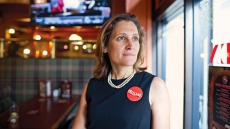VICTORIA — Real estate economists want British Columbia's government to tax foreign property owners and speculators despite Finance Ministry forecasts that the province could lose $1 billion in sales and up to 4,000 construction jobs.
Premier Christy Clark has said housing relief for first-time home buyers is a concern as the government prepares to deliver its budget next month, but she has shot down previous requests for speculation and luxury taxes on foreign investors to cool rising prices.
Thomas Davidoff, a housing economist at the Sauder School of Business, said Monday real estate experts from B.C. universities and business schools have proposed a 1.5-per-cent tax on vacant residential properties to create more rental properties and increase affordability.
The Housing Affordability Fund plan comes as rental-vacancy rates in Vancouver slipped below one per cent last year and the average selling price for a single-family home on the city's west side is above $2.5 million.
"Housing affordability is unquestionably an issue," said Davidoff. "The premier has said it's front and centre and she's asked for a policy that doesn't whack housing demand."

He said the affordability fund could generate up to $90 million in surcharges from vacant homeowners in Vancouver. Homeowners who rent or live in their homes and pay income tax will be able to write off the surcharge, Davidoff said.
"If you are an investor you don't have to pay the tax. All you have to do is turn your vacant unit into a rental unit, and voila, you get to claim the rental income as a credit against this surcharge. That's a pretty strong incentive for people who want to invest here to turn vacant units into rental units."
Last June, the government rejected calls from Vancouver Mayor Gregor Robertson to levy speculation and luxury taxes on foreign owners and speculators as a way to keep prices from rising. But Clark turned down the plan, saying using taxes to drive down prices could hurt current homeowners by reducing their equity.
A six-page Finance Ministry analysis concluded moves to cut foreign investment in B.C.'s housing market would have little impact on house prices because foreign home buyers comprise less than five per cent of the sales market in the Vancouver area.
The analysis also concluded if home prices fell by 10 per cent due to policy measures, Greater Vancouver homeowners would lose about $60 billion in home equity, about $85,000 each.

Last fall, Finance Minister Mike de Jong said the government was reviewing current thresholds for property-purchase tax levels and adjusting the $475,000 property-purchase tax exemption for first-time home buyers as potential housing-relief measures.
B.C.'s current property-purchase tax is charged at a rate of one per cent for the first $200,000 of the sale price and two per cent for the remainder of the market value. The property-purchase tax on a property valued at $250,000 is $3,000.
First-time B.C. home buyers are currently exempt from the property-purchase tax on homes valued up to $475,000.
Davidoff said the transfer-tax plans do little to help people who can't afford to buy and will likely push prices upwards.
"What they are proposing is adding fuel to the fire," he said. "They are adding demand for a fixed stock of housing. That raises the cost of housing."
Urban Development Institute president Anne McMullin said Vancouver needs to look at zoning and development-approval changes to ensure more duplexes and condominiums are built in urban areas.
Davidoff called on Clark to convene a summit that brings together developers, politicians, academics and real estate officials to address housing affordability problems in B.C.

Opposition New Democrat Leader John Horgan said Davidoff's plan is fresh thinking the Clark government must consider.



